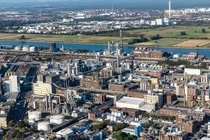Actualités & Médias
BASF joins the World Plastics Council
- Addressing industry topics of global relevance
- Uniting efforts to promote responsible use of plastics
Ludwigshafen, Germany – February 15, 2018 – BASF joined the World Plastics Council (WPC), a global organization of key leaders in the plastics industry. The WPC promotes industry topics of global relevance like the responsible use of plastics, efficient waste management and solutions to marine littering.
“Doing business in a sustainable manner is an integral part of BASF’s strategy and has been a central inspiration already since its foundation. For example, using by-products of one plant as raw materials for another does limit waste generation and increase efficiency. This Verbund principle is part of BASF’s identity,” explained Raimar Jahn, President Performance Materials, BASF. “Additionally, we are involved in initiatives addressing global challenges and engaging entire value chains such as Operation Clean Sweep®. We implement this international program designed to retain plastic pellets from getting lost in the environment,” said Jahn. “Joining the WPC is a way to be further involved in creating a world that provides a viable future with enhanced quality of life for everyone.”
James Seward, Chairman of WPC and Vice President at LyondellBasell, welcomes BASF as new member to help in WPC’s global efforts to deliver sustainable outcomes for the plastics industry and for society. According to WPC, the industry has partnered in many efforts to investigate and prevent marine debris around the world under the ‘Declaration of the Global Plastics Associations for Solutions on Marine Litter’. This has been signed by 70 plastics associations in 35 countries. The most recent Progress Report lists 260 projects that have been completed or are in progress in various parts of the world.
BASF is as well a member of American Chemistry Council and PlasticsEurope that are associate members of the WPC and working towards a more sustainable, circular and resource-efficient economy. The WPC does not replace national or regional plastics associations. Instead, it focuses on issues that require global or at least multi-regional solutions. For a company such as BASF, present in all markets, these widespread actions can be implemented throughout all the regions to contribute to circular economy and a cleaner tomorrow.
Learn more about BASF’s efforts in the area of circular economy:
https://www.basf.com/en/company/sustainability/management-and-instruments/circular-economy.html
Learn more about BASF Plastics:
'https://www.plasticsportal.net/wa/plastics~en_GB/portal
Learn more about marine litter solutions of the plastics industry:
https://www.marinelittersolutions.com
http://www.opcleansweep.eu/
Learn more about World Plastics Council:
https://www.worldplasticscouncil.org/
About BASF
At BASF, we create chemistry for a sustainable future. We combine economic success with environmental protection and social responsibility. The approximately 114,000 employees in the BASF Group work on contributing to the success of our customers in nearly all sectors and almost every country in the world. Our portfolio is organized into five segments: Chemicals, Performance Products, Functional Materials & Solutions, Agricultural Solutions and Oil & Gas. BASF generated sales of about €58 billion in 2016. BASF shares are traded on the stock exchanges in Frankfurt (BAS), London (BFA) and Zurich (BAS). Further information at www.basf.com.
P-18-107

